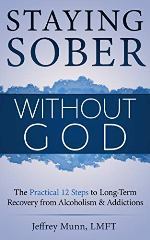The Growth of Secular AA
By Roger C.
Early History
AA Agnostica was launched a decade ago!

The website was created by me and another person on June 15, 2011. It was initially called AA Toronto Agnostics and it was created simply to let people know about the times and locations of two agnostic meetings, Beyond Belief and We Agnostics, after the groups had been booted out of the Greater Toronto Area Intergroup (GTAI).
At the time these were the only two secular AA groups in all of Canada. Beyond Belief was my homegroup. The groups were expelled from the GTAI for one simple reason: we used a secular version of the 12 Steps.
Traditional AA can be rather dogmatic, and in Toronto it certainly was way back then. In the conference-approved Big Book, published a million years ago, God is an essential part of recovery. With a “God” – or a “Him” (this deity is both Christian and male) – in six of the 12 steps, a secular version of these steps was not allowed by the GTAI. Thus, the expulsion of the two groups. After a legal challenge that lasted roughly six years, we were allowed back in in early 2017.
In the early months of the website, there was plenty of pressure to remove a secular version of the 12 Steps that I had added to the menu.
The Steps were never removed. The Alternative 12 Steps (there are six different versions on the website these days) is the most popular menu item for people visiting AA Agnostica: roughly 150,000 viewers over the past decade, and that’s forty or so each and every day.
Indeed, I was inspired by the interest in the secular 12 steps to write a book on the topic. Published in early 2013 it is called The Little Book – A Collection of Alternative 12 Steps (with a second edition and a French version, Le petit livre jaune, published earlier this year).
Okay, back to the first days of AA Agnostica. Early on I decided to invite people to post articles on the website. I don’t remember why I did that. There are very few sites that invite people to share their experience, strength and hope and at the time I didn’t know of a single such website. Certainly, none that invited recovering alcoholics and addicts to write articles. Nevertheless, in the first year, forty-six articles were published on AA Agnostica. These were written by twenty-two people from three countries: Great Britain, Canada and the United States.
The growth of the website was on its way.

Middle History
Over the next few years, we became rather busy. For instance, in the period between mid-June 2014 and mid-June 2015 a total of 94 articles were published, written by 50 different people. And all of this is compared to 62 articles the previous year and 46 in each of the first two years of AA Agnostica.
Moreover, two important things were launched in April 2013.
First, AA Agnostica decided to help nonbelievers start their own agnostic AA meetings.

On the Home Page we added a message that read, “Want an agnostic AA group in your town or city? Click here”. And literally thousands of people did just that.
They filled out a form with their location, email address, and an optional phone number and comment. Others nearby that did the same would be connected, filled in on what needed to be done (How to Start an AA Meeting), and often a new meeting would be launched.
This was all managed by Chris G who estimates that this project helped start approximately eighty meetings throughout North America. More about that here: My Brain Goes Fuzzy When They Talk About God.
The project was ended in June of 2016. It was simply felt the goal had been achieved.
Okay, more numbers. When AA Agnostica was first launched there was a grand total of 87 secular AA groups in the entire world. In 2012 there were 99. When the conference in Santa Monica was held in 2014 (more about this coming up) there was a total of 181 agnostic AA meetings. In the next year, growth spiked to 288 meetings. When the 2016 conference was held in Austin there were now 320 secular AA meetings worldwide. (These numbers were shared on a website launched in 2002, Agnostic AA New York City).
Okay, now on to an event launched in April 2013.

At the time it was known as the WAFT (We Agnostics and Free Thinkers) IAAC (International AA Convention). Two women, Dorothy H and Pam W, who had met at the We Agnostics meeting in Hollywood, were the main planners of the convention. They chose to hold this first ever secular AA event in Santa Monica, California in November 2014.
What a plan that was! And it was so very well executed. Dorothy travelled across the United States and into Canada to attend as many of the 150 secular AA meetings as possible and encourage people to attend this upcoming convention.
And AA Agnostica also did whatever it could to help. Our first topic about the convention was an interview with Pam, posted in mid-June 2013: An AA Convention for We Agnostics. Overall, five articles were posted prior to the convention, one on each day of the convention, and two after and about the convention.
It was an historical event, to say the least, held at a Unitarian Universalist Church which turned out to be so much better than a conference held in a hotel! Here is a quote about the conference: “The convention lasted three very busy days. Consistent with its theme of Many Paths to Recovery, it was stunningly rich and diverse with fifteen panels, twenty-three workshops (and) ten speakers.” That is from an article I wrote at the very end of 2014, The Impossible Becomes Possible.
Two other conventions – now called conferences – were held after that, one in Austin, Texas (2016) and one in Toronto, Ontario (2018). Of course, articles were published before and after both of those here on AA Agnostica. And the next in-person International Conference of Secular AA (ICSAA) is now expected to be held in Bethesda, Maryland at the end of October.
A final topic in this section of today’s article: Books!
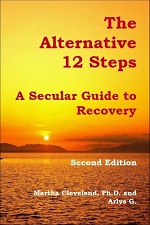 Over the years, AA Agnostica has published a total of 10 books. Except for the second edition of The Little Book and its French version, Le petit livre jaune, all of them were published in the middle years of the website: between 2013 and 2017. One of my favorites has always been The Alternative 12 Steps – A Secular Guide to Recovery. Written by two women, and first published in 1991 – amazing! – we published its second edition in 2014.
Over the years, AA Agnostica has published a total of 10 books. Except for the second edition of The Little Book and its French version, Le petit livre jaune, all of them were published in the middle years of the website: between 2013 and 2017. One of my favorites has always been The Alternative 12 Steps – A Secular Guide to Recovery. Written by two women, and first published in 1991 – amazing! – we published its second edition in 2014.
Let me explain why these books were published. When I got sober in 2010, I couldn’t find any books that helped me with my recovery. None. Nada. And I couldn’t stand the Big Book. Too much God, too outdated and ancient…
So, we published these ten books. And two of them were by friends who had written a number of articles for AA Agnostica. One was by Thomas B, who wrote 21 articles, and his book is called Each Breath a Gift – A Story of Continuing Sobriety. The other was by bob k, the author of Key Players in AA History. bob has written a total of 54 articles shared on AA Agnostica and I am now helping him produce a second edition of Key Players (this one will be personally published by bob).
Overall, 93 books – each and every one of them about secular recovery – were reviewed on AA Agnostica! An average of 9.3 a year, I guess.
In fact, the fifth article posted on AA Agnostica on July 27, 2011 was a review of Marya Hornbacher’s book Waiting: A Nonbeliever’s Higher Power. The review was written by my friend John M (who now lives on Vancouver Island). A few years later I had the pleasure of being on a panel with Marya at the WAFT International AA Convention.
Another one of my all-time favorite books was written by Jeffrey Munn, Staying Sober Without God. The review was written by another friend, Heather C, and I was delighted to meet Jeffrey Munn at the Secular Ontario AA Roundup (SOAAR) held in Hamilton in 2019.
Now, why am I telling you these book reviewers were friends and I met the authors? Simply because that has been the result of creating AA Agnostica: I have met many people and participated in many events. It’s all about connection.
And not just connection for me. The goal of AA Agnostica has always been to connect people with the reality of recovery without a God. And this happens – more and more these days – in Alcoholics Anonymous, despite the million-year-old Big Book. There is no need for an anthropomorphic, interventionist and male deity. The website connects people with people who’s recovery is all about their wonderful and non-godly experience, strength, and hope. That – from day one – has been AA Agnostica. I could go on and on with this topic but, well, I’ll stop here.
Alright, that’s our middle history. Secular AA groups worldwide. Three conferences, the first being in Santa Monica. And books! And now…

Today’s History
Over the past twelve months, ninety articles have been posted on AA Agnostica. Twenty of them were chapters of the book Do Tell, which had already been shared on the website when the book was published in 2015. Another twenty articles had been posted on other websites and were reposted here because they were well-written and useful, for example: Atheists and Agnostics: The Meaning of Life.
The fifty original articles were written by people from several different continents and countries: Canada, the USA, Latin America, Australia, Poland, England, Thailand and South Africa. Over the last decade, and counting today’s article, a total of 695 articles have been posted and the vast majority have been originals.
More numbers. There have been 3,500,000 views on AA Agnostica over the decade. These views are people who visit the website once, and never come back. And readers who regularly read our articles – a bunch of the viewers! Now, I know that total is not very many compared to, say, the Walmart website. But remember, these are recovery people, and mostly secular recovery people. That total over the years amounts to roughly 1,000 people every day – the first two years the number was not nearly that high – and these days roughly 200 different articles are viewed each and every day.
For the record, the most popular article is An Atheists Guide to 12-Step Recovery. Posted in 2012, to date it has had a total of 200,000 viewers.
And now, a question: Is AA growing up? Yes, it is. Slowly, but I hope and believe, surely. When the Big Book was written, 92% of Americans self-identified as Christians. That has dropped by almost a third; today 65% of Americans identify as Christians. As Bob Dylan put it: “The times they are a changin’”.
Thus, this website and the interest in it. But it is not the only such website these days. Joe C, the author of Beyond Belief, launched Rebellion Dogs Publishing in 2011. John Sheldon has been responsible for several websites. One of them is Secular AA, which first was created – with a different name, WAAFT Central – in 2014 after the Santa Monica convention. John also created AA Beyond Belief in 2015 which has now evolved into the Beyond Belief Sobriety Podcast.
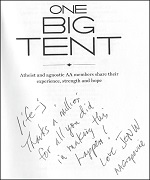 Moreover, Alcoholics Anonymous is learning to accommodate we secular people. In 2014 our friend life-j wrote an article, A Grapevine Book for Agnostics and Atheists in AA. We asked AA Grapevine to publish a book of the 40 secular stories it had posted since 1947. In 2015, they said “no”. We pushed and pushed. In 2016, they said “yes”!
Moreover, Alcoholics Anonymous is learning to accommodate we secular people. In 2014 our friend life-j wrote an article, A Grapevine Book for Agnostics and Atheists in AA. We asked AA Grapevine to publish a book of the 40 secular stories it had posted since 1947. In 2015, they said “no”. We pushed and pushed. In 2016, they said “yes”!
Finally, in 2018, the book was published: One Big Tent – Atheist and Agnostic AA Members Share Their Experience, Strength and Hope. It isn’t the best possible book, but it is certainly a move in the right direction.
As well, the GSO now has an online list of all AA meetings in North America, and it is called the Meeting Guide. And guess what? One of the categories is “secular”.
Does the GSO need to do more. Damn right! One of the things it must do is ditch “conference-approved” as its only category of literature. Go to a traditional AA meeting and the only things on its literature table are “conference-approved” books and pamphlets. Sad, given that so many good books about recovery have been written since that million-year-old Big Book, but true.
A final thought about the growth of secular AA meetings. As mentioned earlier, the total worldwide was at 320 in 2016. By 2020 the number had grown to roughly 500. So, what happened next? Well, the pandemic hit hard in March 2020. Had you ever heard of “zoom” meetings before then? It has had a huge impact on the secular AA movement. As bob k put it in an article on AA Beyond Belief, “The pandemic has taught us some things – one being that the thirst for secular AA exceeds our most optimistic imaginings” (Pandemics, Zoom & Happy Heathens).
It will be interesting to see the new numbers, post-pandemic…

Our Last Original Article
The Eleventh Year of AA Agnostica
After a decade of sharing every Sunday and sometimes on Wednesdays, today’s post is meant to essentially be the last original article posted on AA Agnostica.
Over the next year, the eleventh year, we are considering re-posting some of the most popular articles on the website. Perhaps the top 50 of our total of 695. Frankly, we haven’t decided how many yet.
On the other hand, if there is news that really must be shared – say, for example, about this year’s ICSAA conference – and we receive an article, we would consider sharing that. But certainly, no more new articles every Sunday. None on Wednesdays. As we mentioned earlier, a couple of hundred different articles are viewed every single day. And for that very reason, we do indeed plan to keep the website up and alive for the next years.
AA Agnostica: A space for AA agnostics, atheists and freethinkers worldwide. It has been a great decade! I have enjoyed it very much and have learned a great deal. And the connections. Amazing. There is no doubt that the secular AA movement will continue to grow and expand over the next years. As it should. And as it must.
Onwards and upwards, folks.

For a PDF of this article, click here: Ten Years Old!
The founder of AA Agnostica has written and posted a total of 84 articles on the website:
- Ten Years Old! (June 13, 2021)
- Songs about Recovery (March 28, 2021)
- Songs about Addiction (March 21, 2021)
- The Little Book – Second Edition (January 13, 2021)
- Questions & Answers – AA Agnostica (August 16, 2020)
- Nine Years Old! (June 14, 2020)
- Reshaping the AA Culture (June 7, 2020)
- AA Meeting Guide (March 25, 2020)
- From 0 to 20 Secular AA Groups in Ontario (March 4, 2020)
- Secular AA Pamphlets (February 16, 2020)
- life-j (January 12, 2020)
- Celebrating Ten Years: Canada’s Oldest Secular AA Group (November 20, 2019)
- The Secular Ontario AA Roundup (August 14, 2019)
- The Purpose of AA Agnostica (June 23, 2019)
- AA Hospital and Institution Conferences (March 13, 2019)
- What is AA? (March 3, 2019)
- AA and the Lord’s Prayer (February 3, 2019)
- Do Tell! and One Big Tent – Two Books of Stories by AA Atheists (July 22, 2018)
- Survey Results – Literature for We Agnostics (April 1, 2018)
- Conclusion: Who We Are (January 11, 2018)
- Chapter 16: A Growing Secular Movement (December 14, 2017)
- How to Start a Secular AA Meeting – FAQ (November 30, 2017)
- Chapter 14: Progress Not Perfection (October 8, 2017)
- Chapter 13: Santa Monica Convention (October 5, 2017)
- Chapter 12: Literature for We Agnostics (September 7, 2017)
- Chapter 11: Conference-approved Literature (August 24, 2017)
- Chapter 10: Conformity and Conventional AA (July 20, 2017)
- Chapter 8: Accepting Special Composition Groups (June 25, 2017)
- Six Years Old! (June 15, 2017)
- Chapter 7: Agnostics and Human Rights (June 7, 2017)
- Chapter 6: Changing the 12 Steps (May 31, 2017)
- Chapter 5: More Rejection (May 25, 2017)
- Chapter 4: Early History (May 18, 2017)
- Chapter 3: The God Bit (May 11, 2017)
- Chapter 2: Rejection (May 4, 2017)
- Chapter 1: An Agnostic in AA (April 27, 2017)
- Introduction: Time to Rally (April 20, 2017)
- Toronto Intergroup Yields to Agnostics in AA (February 2, 2017)
- Atheists in AA – How It Works (August 10, 2016)
- The Last Post (June 15, 2016)
- The Second Secular AA Conference (April 17, 2016)
- Changing the 12 Steps of AA (February 23, 2016)
- AA Atheists and Human Rights (February 21, 2016)
- A History of Secularism in AA (January 26, 2016)
- A Special Project: The Practical Book (December 6, 2015)
- The Spirit of Rotation (September 30, 2015)
- Four Years Old! (June 14, 2015)
- Do Tell! Stories by Atheists & Agnostics in AA (May 24, 2015)
- A Tribute to Ernie Kurtz (May 3, 2015)
- No Grapevine Book for Atheists in AA (February 18, 2015)
- Key Players in AA History (February 8, 2015)
- The Impossible Becomes Possible (December 28, 2014)
- Still No Pamphlet for Agnostics in AA (August 17, 2014)
- The Alternative 12 Steps – Second Edition (Foreword) (July 30, 2014)
- Buddhism and the 12 Steps (July 16, 2014)
- Three Years Old! (June 15, 2014)
- Agnostic Groups: An Asset for the Future of AA (May 11, 2014)
- Don’t Tell – Introduction (May 7, 2014)
- A True Partnership (April 9, 2014)
- AA – Spiritual Not Religious (March 16, 2014)
- One alcoholic judging another (January 19, 2014)
- The Biology of Spirituality (January 5, 2014)
- AA Started in Riots (December 8, 2013)
- An AA Pamphlet for Agnostics – The 1980s (November 10, 2013)
- Booting the Bastards Out (October 13, 2013)
- An AA Pamphlet for Agnostics – The 1970s (August 25, 2013)
- Two Years Old! (June 23, 2013)
- An AA Convention for We Agnostics (June 16, 2013)
- The General Service Conference Stumbles (June 9, 2013)
- A Million Little Pieces (January 20, 2013)
- In the Realm of Hungry Ghosts (December 9, 2012)
- We Are Not Saints (December 2, 2012)
- The Lord’s Prayer and the Law (November 4, 2012)
- Responsibility is our Theme (October 7, 2012)
- The Origins of the 12 Steps (September 16, 2012)
- Mindfulness and the 12 Steps (September 2, 2012)
- One Year Old! (June 10, 2012)
- Another Agnostic Group Ousted (May 6, 2012)
- The Varieties of Recovery Experience (January 25, 2012)
- The “Don’t Tell” Policy of AA (January 5, 2012)
- Let the Wood Burn (December 13, 2011)
- Indy We Agnostics Relisted (November 29, 2011)
- The Spirituality of Imperfection (November 2, 2011)
- The Responsibility Declaration (July 3, 2011)
 Roger C has been an alcoholic in recovery since March 8, 2010. Later that summer he joined the Toronto group Beyond Belief, at the time the only secular AA meeting in all of Canada. In September, a second Toronto group, We Agnostics, was launched. The two were booted out of the Greater Toronto Area Intergroup on May 31, 2011. And that’s exactly what inspired Roger to launch a website in June of that year that became AA Agnostica.
Roger C has been an alcoholic in recovery since March 8, 2010. Later that summer he joined the Toronto group Beyond Belief, at the time the only secular AA meeting in all of Canada. In September, a second Toronto group, We Agnostics, was launched. The two were booted out of the Greater Toronto Area Intergroup on May 31, 2011. And that’s exactly what inspired Roger to launch a website in June of that year that became AA Agnostica.
The post Ten Years Old! first appeared on AA Agnostica.
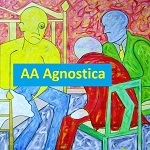
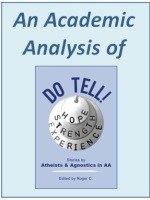

![Do Tell! [Front Cover]](https://nrdblogs.nationalrehabdirectory.net/wp-content/uploads/2020/09/Do-Tell-Full-Blue-Front-Cover-200-FRAMED.jpg) This is a chapter from the book: Do Tell! Stories by Atheists and Agnostics in AA.
This is a chapter from the book: Do Tell! Stories by Atheists and Agnostics in AA. 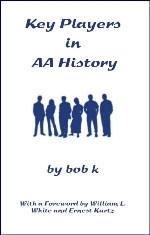
 ):
):
